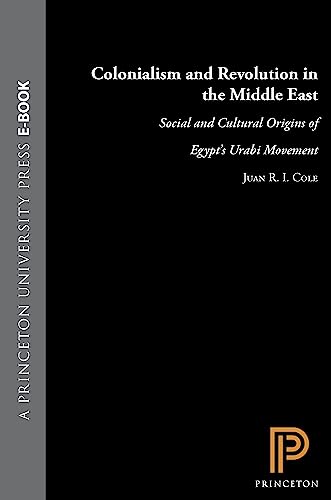Artículos relacionados a Colonialism and Revolution in the Middle East: Social...
Colonialism and Revolution in the Middle East: Social and Cultural Origins of Egypt's Urabi Movement (Princeton Studies on the Near East) - Tapa dura

Sinopsis
In this book Juan R. I. Cole challenges traditional elite-centered conceptions of the conflict that led to the British occupation of Egypt in September 1882. For a year before the British intervened, Egypt's viceregal government and the country's influential European community had been locked in a struggle with the nationalist supporters of General Ahmad al-`Urabi. Although most Western observers still see the `Urabi movement as a "revolt" of junior military officers with only limited support among the Egyptian people, Cole maintains that it was a broadly based social revolution hardly underway when it was cut off by the British. While arguing this fresh point of view, he also proposes a theory of revolutions against informal or neocolonial empires, drawing parallels between Egypt in 1882, the Boxer Rebellion in China, and the Islamic Revolution in modern Iran.
In a thorough examination of the changing Egyptian political culture from 1858 through the `Urabi episode, Cole shows how various social strata--urban guilds, the intelligentsia, and village notables--became "revolutionary." Addressing issues raised by such scholars as Barrington Moore and Theda Skocpol, his book combines four complementary approaches: social structure and its socioeconomic context, organization, ideology, and the ways in which unexpected conjunctures of events help drive a revolution.
"Sinopsis" puede pertenecer a otra edición de este libro.
Acerca del autor
Juan R. I. Cole is Associate Professor of Middle East History at the University of Michigan. He is the author of Roots of North Indian Shi`ism in Iran and Iraq (California/Oxford)
"Sobre este título" puede pertenecer a otra edición de este libro.
EUR 28,88 gastos de envío desde Reino Unido a Estados Unidos de America
Destinos, gastos y plazos de envíoResultados de la búsqueda para Colonialism and Revolution in the Middle East: Social...
Colonialism and Revolution in the Middle East
Librería: Mispah books, Redhill, SURRE, Reino Unido
hardcover. Condición: Good. Good. book. Nº de ref. del artículo: ERICA82906910568385
Cantidad disponible: 1 disponibles

